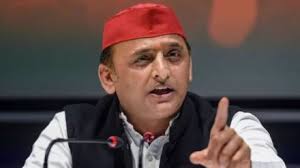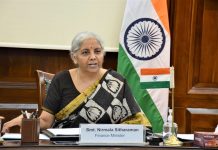Also, a tactical ticket distribution by Samajwadi Party chief Akhilesh Yadav showcased his political maturity. He employed inclusiveness while selecting candidates to free the party from the tag of being a Yadav-Muslim party. A report by Mudit Mathur

In the politically most crucial state of Uttar Pradesh, when the fight was reduced to “Ram versus Roti,” people opted for “Roti,” rejecting the camouflaged propaganda sponsored by BJP stalwarts with the help of excessively compromised print and TV media, which allegedly fabricated a hype about BJP’s landslide victory.
The Samajwadi Party chief, Akhilesh Yadav, emerged as the third biggest player after the Congress Party on the national scene, securing 37 seats from Uttar Pradesh while the BJP bagged 33. His shrewd outreach to Dalit classes and most backward classes filled the political vacuum created due to inertia gripping around Mayawati. Factors like ticket distribution, PDA (Pichada, Dalits, Alpsankhyak) outreach, and anger among the Rajput community helped the Samajwadi Party-Congress alliance in Uttar Pradesh win 43 of the 80 seats.
Varanasi (oldest religious city in the world, Kashi) was nurtured with a lot of development and infrastructural projects after Prime Minister Narendra Modi adopted it as his parliamentary constituency. But this time, INDIA bloc gave him a tough fight diminishing the aura of indomitability as borne out by sharp reduction of his victory margin.
Despite unlimited resources at his hand, Modi could barely win with a thin margin of 1.52 lakh votes against a predicted win of 10 lakh votes. So, winning with such a narrow margin gave no reason to BJP workers to go for any sort of jubilation on the streets. His victory margin dipped from 4.25 lakh votes in 2019 to a miserable 1.52 lakh votes this time. The time has come for his party to review what went wrong for him to face such a decline in his popularity.
This time, social media platforms proved to be the more reliable fora with their almost accurate poll projections. The BJP’s ambitions were too high as the party claimed this time, it would win all 80 seats. However, with the counting of votes, its euphoria died down as the results showed major reversals as the party could only win 33 seats, thereby losing 29 seats from its 2019 tally.
The big setback came to the BJP as its 27 sitting members of parliament, including seven union ministers, lost the elections. It gave a big jolt to the BJP in its heartland where its Hindutva project was going on in full swing and thus, it caused huge embarrassment to the BJP and its top ideologues.
The BJP faced the biggest in Amethi. Prominent Union Minister Smriti Irani who defeated Congress leader Rahul Gandhi in 2019, lost the most prestigious battle in Gandhi’s bastion Amethi. An ordinary Congress worker, Kishori Lal Sharma, a loyal aide of the Gandhi family, defeated her by a margin of 1,67,196 votes despite top BJP leadership from the centre and the state having done an extensive high-voltage campaigning for her, addressing public meetings and spending a lot of money.
Raebareli was another prestigious and contentious seat from where Congress leader Sonia Gandhi fielded her son, Rahul Gandhi, leaving the traditional seat for him. BJP fielded a Congress turncoat and state minister Dinesh Pratap Singh against him equipped with enormous money power and a battery of top leaders. Rahul’s sister, Priyanka Gandhi Vadra took command of the election campaign herself and went to nook and corner of both the constituencies. Rahul Gandhi won with a record margin of 3,90,030 votes and his lead was more than Modi and Rajnath Singh, whose victory margin significantly dipped this time in the face of anti-incumbency.
Uttar Pradesh had been a testing ground to sow the seeds of the “Hindu Rashtra.” BJP stalwarts Prime Minister Narendra Modi and Chief Minister Yogi Adityanath synchronized their election speeches aimed at polarising votes in this politically most crucial state which send 80 members to the Lok Sabha.
The entire idea was to discredit opposition parties by painting them as corrupt, and incapable, having family-centric politics instead of nation-centric one. Law and order was another issue on which these leaders attacked Samajwadi chief Akhilesh Yadav’s rule as compared to the “Bulldozer justice” introduced by Chief Minister Yogi Adityanath.
Hindi-speaking Uttar Pradesh is home to many holy Hindu pilgrim centres like Mathura-Kashi, which in many ways functioned as a labortary for the BJP’s Hindutva politics by rousing the communal passions. The BJP has relied on a multifaceted Hindutva strategy in the state, leveraging socio-religious issues to consolidate its support base and secure electoral victories.
Prime Minister Modi in his election rallies in eastern Uttar Pradesh kept accusing the Congress of making several attempts to stall the construction of the Ram temple in Ayodhya and “insulting” the deity by “rejecting an invitation to the “pran pratishtha” (construction ceremony). The BJP accused opposition parties of practicing policies of minority appeasement.
The tactical ticket distribution by Samajwadi Party chief Akhilesh Yadav showcased his political maturity as he employed inclusiveness while selecting candidates and freeing the party from the tag of Yadav-Muslim party. BJP master strategist Amit Shah did the same social engineering in 2014 when he micromanaged these communities to alienate them from the Samajwadi Party and BSP. The breakup of 37 winner candidates from SP, comprises 20 OBCs including five Yadavs, 9 Dalits, 4 each from upper castes, and Muslims. His PDA formula countered the hype of poll predictions and exaggerated media propaganda.
The controversial Union Minister of State for Home Affairs, Ajay Mishra Teni, who has been enjoying the proximity of Home Minister Amit Shah lost to the Samajwadi Party’s Utkarsh Verma from the Kheri Lok Sabha seat by a margin of 34,329 votes. He was running for a third term and aiming for a hat-trick from the same seat. Teni faced resentment over the Lakhimpur Kheri incident, whose son is accused of knocking down protesting farmers, who were protesting against the farm laws which were later repealed by the Modi government, and a journalist, with the vehicle he was riding.
Samajwadi Party won not only the Ayodhya seat but the entire region including Sultanpur, Ambedkar Nagar, and Shrawasti while the other two seats, Amethi and Barabanki were bagged by the Congress party. SP candidate Avdhesh Prasad,79, defeated the BJP in the Faizabad constituency by more than 54,000 votes. Prasad was born into a Pasi (Dalit) family in 1945 in a village in Sohawal tehsil of Faizabad district, renamed Ayodhya. The defeated BJP candidate was one of the few leaders who said 400 seats are required for the BJP to change the present Constitution.
Another big blow came from Muzaffarnagar, which saw a clash between the two Jat leaders. SP’s Harendra Malik defeated union minister of state for fisheries, animal husbandry, and dairying Sanjeev Balyan in a close contest. Balyan lost by a margin of 24,672 votes. Balyan had won the Muzaffarnagar seat in 2014 and 2019. Union Minister of State for micro, small, and medium enterprises (MSME) Bhanu Pratap Verma lost to SP’s Narayan Das Ahirwar from UP’s Jalaun by 53,898 votes.Verma is a five-time MP from this seat, having won it in 1996, 1998, 2004, 2014, and 2019.
Union Minister of State for Consumer Affairs, Food and Public Distribution, and Rural Development Sadhvi Niranjan Jyoti lost to SP’s Naresh Chandra Uttam Patel by 33,199 votes from UP’s Fatehpur. She won the same seat in 2014 and 2019 decisively with winning margins crossing 1.8 lakh and 1.9 lakh and was aiming for a third term.
Samajwadi Party candidate and former Uttar Pradesh minister RK Chaudhary triumphed over Union Minister of State for Housing and Urban Affairs and BJP candidate Kaushal Kishore in the Mohanlalganj (reserved) parliamentary seat by a margin of 70,292 votes. Samajwadi Party’s Birendra Singh defeated BJP’s Mahendra Nath Pandey, the Union Minister for Heavy Industries, in the Chandauli parliamentary constituency by approximately 21,000 votes.
Results could bring more cheers in the opposition camp had it started its election campaign earlier as they could not correctly assess their collective strength and people’s resentment on the ground over core issues of unbearable price rise, growing unemployment, faulty Agniveer scheme, insensitive government policies to resolve farm distress, and concentration of national wealth in the hands of a few favoured corporates.













